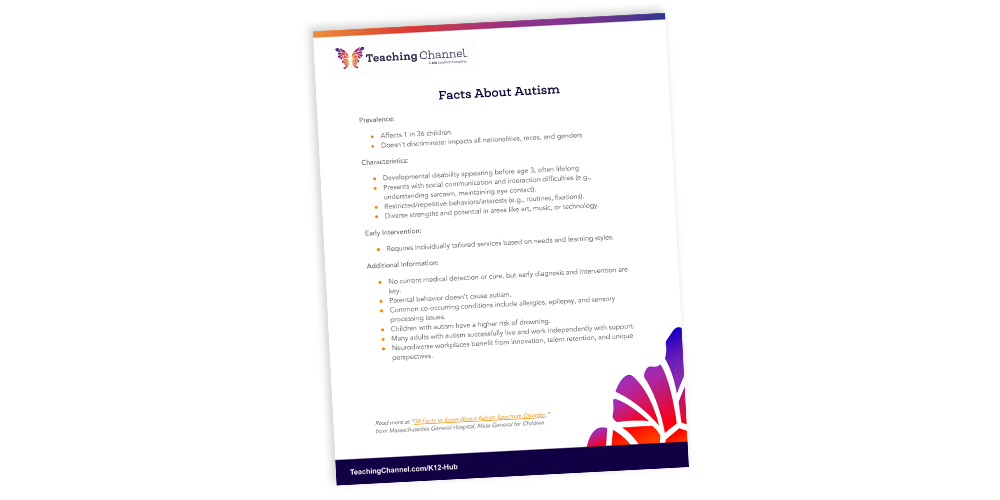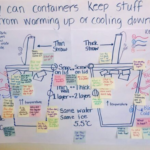Individuals with autism have a variety of superpowers all their own, and this is the month to celebrate them. Take a peek below to learn 5 things about students with autism!
1. The Basics of Autism
Prevalence:
- Affects 1 in 36 children
- Doesn’t discriminate: impacts all nationalities, races, and genders
Characteristics:
- Developmental disability appearing before age 3, often lifelong
- Presents with social communication and interaction difficulties (e.g., understanding sarcasm, maintaining eye contact).
- Restricted/repetitive behaviors/interests (e.g., routines, fixations).
- Diverse strengths and potential in areas like art, music, or technology.
Early Intervention:
- Requires individually tailored services based on needs and learning styles.

2. Identity-First vs Person-First Language
In the past, best practices in language conventions has been rooted “person-first” language, or “A person with autism.” There is now a shift in this convention: many autistic individuals prefer the use of “identity-first language,” rather than “person-first language.” This is a change in recent years, and not everyone is a fan of the switch. Because the field is divided on the preferences of people with autism, it is currently acceptable to use both “autistic individuals/students” and “students with autism/ASD.” We have elected to use both “person-first” and “identity-first” language conventions.
You can read more about these language conventions in the following resources:
- “Writing Respectfully: Person-First and Identity-First Language,” from Shannon Wooldridge, National Institutes of Health
- “Person-First Vs. Identity-First Language for Discussing Disabilities,” by Sarah Scott, Very Well Family
3. Reducing Stigma
While we celebrate the strengths of autistic students, it is important to address myths about autism and neurodiversity to reduce the stigma of autism. Review the following sites to learn more:
- “Myths and Facts about Autism Spectrum Disorder,” from the Kennedy Krieger Institute
- “Debunking the Myths: Why Everything You Know About Neurodiverse Learners is Wrong,” by Sean Stowers
4. Focusing on Strengths
Those working with both autistic and neurodivergent individuals have adopted a “strengths-based” approach, or focusing on what the individuals can do, rather than a “deficit-based” approach, centered on what they cannot do.
People with autism can have a variety of superpowers, including, but not limited to, the following:
- Sensory Perception: People with autism often have heightened sensory experiences. This can translate to a remarkable ability to pick up on subtle details in sound, sight, touch, taste, and smell.
- Attention to Detail: A keen eye for detail is a common strength among neurodivergent individuals. This allows them to excel at tasks that require focus and accuracy, like proofreading, coding, or scientific research.
- Focus and Passion: Many neurodivergent people can become deeply absorbed in their interests, leading to intense focus and dedication. This passion can fuel creativity, innovation, and mastery in their chosen field.
- Visual Thinking: Neurodivergent individuals often excel at visual thinking, allowing them to process information and solve problems through mental imagery and patterns. This can be a huge asset in fields like engineering, design, and mathematics.
- Empathy: While sometimes stereotyped as lacking empathy, some autistic individuals can exhibit a deep and nuanced form of empathy. They may be highly attuned to the emotions of others, even if they struggle to understand social cues.
- Curiosity and Innovation: A natural curiosity and a different way of seeing the world can lead to innovative solutions and creative thinking. Neurodivergent individuals often challenge the status quo and come up with new and unexpected approaches to problems.
- Honesty and Integrity: Many neurodivergent individuals value directness and honesty. This can be a refreshing strength in a world where social niceties can sometimes mask true feelings.
5. Additional Information
- No current medical detection or cure, but early diagnosis and intervention are key.
- Parental behavior doesn’t cause autism.
- Common co-occurring conditions include allergies, epilepsy, and sensory processing issues.
- Children with autism have a higher risk of drowning.
- Many adults with autism successfully live and work independently with support.
- Neurodiverse workplaces benefit from innovation, talent retention, and unique perspectives.
We want to celebrate our autistic and neurodiverse students, share what you love about your students (or others!) with autism by tagging us on social media @TeachingChannel. For more tips and processes for how to include students with disabilities like Autism, check out course 5258: Inclusive Support for Students with Severe and Multiple Impairments (SMI) or course 776: Across The Spectrum: Teaching Students with Autism.
About the Author

Betsy Butler (she/her) is a Professional Learning Specialist at Teaching Channel. She holds a B.A. in English, a Master’s in Education, and has been teaching since 1992. Betsy uses her three decades of teaching experience to write and revise our courses while selecting the perfect accompanying texts. Her specialty areas include ELA, special education topics, behavior management, and mental health.
Fun Fact: Betsy’s daily conquest is solving the New York Times crossword puzzle!






